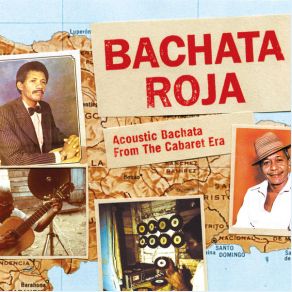Bachata Roja: Acoustic Bachata from the Cabaret Era
Download links and information about Bachata Roja: Acoustic Bachata from the Cabaret Era. This album was released in 2007 and it belongs to World Music, Latin genres. It contains 14 tracks with total duration of 44:59 minutes.

|
|
|---|---|
| Release date: | 2007 |
| Genre: | World Music, Latin |
| Tracks: | 14 |
| Duration: | 44:59 |
| Buy it NOW at: | |
| Buy on iTunes $9.99 | |
Tracks
[Edit]| No. | Title | Length |
|---|---|---|
| 1. | Muero Contigo (Rafael Encarnación / Rafael Encarnacion) | 2:46 |
| 2. | O La Pago Yo O La Paga Ella (Marino Pérez / Marino Perez) | 4:18 |
| 3. | La Muñeca (Eladio Romero Santos) | 2:58 |
| 4. | Equivocada (Blas Duran) | 2:27 |
| 5. | Ladrona (Felix Quintana) | 3:08 |
| 6. | Estoy Aqui Pero No Soy Yo (Juan Bautista) | 3:40 |
| 7. | Olvida Ese Hombre (Augusto Santos) | 2:39 |
| 8. | Si Me La Dan La Cojo (Augusto Santos) | 3:51 |
| 9. | El Salón (Julio Angel) | 2:57 |
| 10. | Yo Pagaré La Cerveza (Julio Morales) | 3:30 |
| 11. | Amor Del Bueno (Ramon Cordero) | 2:54 |
| 12. | Esta Noche Me La Llevo (Efraín Morel / Efrain Morel) | 2:57 |
| 13. | Mi Secreto (Leonardo Paniagua) | 4:14 |
| 14. | Asesina (Juan Bautista) | 2:40 |
Details
[Edit]Since the early ‘60s Bachata has been the music of the Dominican Republic’s working class. Like Jibaro in Puerto Rico, Bolero in Cuba and Ranchera music in Mexico, Bachata emerged from the rapid industrialization of former agricultural communities. Songs once played at informal rural parties or “bachatas” were adapted to suit the atmosphere of the cabarets and barrooms that sprang up along the commercial thoroughfares of cities like Santiago and Santo Domingo. Formerly acoustic instruments were amplified, and lyrics that once told of long days spent laboring in the fields were modified to address a different set of concerns: the poverty of urban slums, nights spent in barrooms and days spent laboring in factories. Bachata Roja collects fourteen songs and documents the birth of Bachata and its evolution from a rural to an urban musical form. Every song included here is a minor masterpiece, from the plaintive lament of Rafael Encarnación’s “Muero Contigo” to the innovative electric guitar playing of Juan Bautista’s “Asesina,” which displays the rapid picking style that would come to define the Bachata hits of the ‘90s and ‘00s.